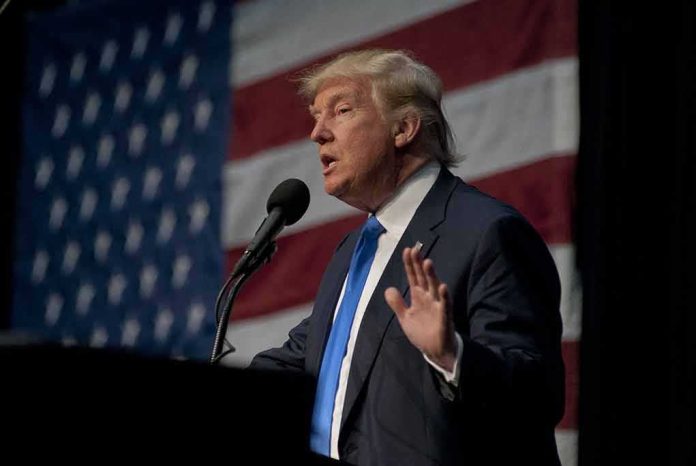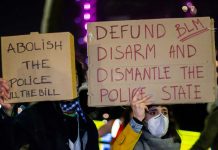
When a sitting president floats the idea of jailing local leaders for allegedly failing to protect federal agents, the line between political theater and constitutional crisis blurs in ways that demand more than a passing glance.
Story Snapshot
- President Donald Trump publicly suggested jail time for Chicago’s mayor and Illinois’s governor over their handling of ICE protection.
- The unprecedented call raises questions about federal authority versus state and local autonomy.
- Chicago’s relationship with federal immigration enforcement has long been a flashpoint in national politics.
- The episode spotlights the ongoing, high-stakes tug-of-war over law enforcement and immigration policy in America’s urban centers.
Trump’s Jail Suggestion Shocks Political Establishment
President Donald Trump’s recent suggestion that Chicago Mayor Brandon Johnson and Illinois Governor J.B. Pritzker should face jail for “failing to protect ICE” was delivered not as an offhand remark, but as a pointed provocation that ricocheted through the nation’s political landscape. The president’s statement, made during a nationally televised address, signaled a new front in the ongoing battle between the White House and local officials over immigration enforcement. For decades, federal-local clashes have simmered, but rarely has a president so openly threatened incarceration for what he frames as dereliction of duty. The assertion startled even some of Trump’s staunchest supporters, who privately wondered whether such a move was legally feasible or simply designed to energize his political base.
Chicago’s status as a sanctuary city—meaning it limits cooperation with federal immigration authorities—has made it a perennial target for federal criticism. Trump’s remarks tapped into long-standing frustration among conservatives who view sanctuary policies as not just misguided, but actively dangerous. Yet, the idea of jailing elected officials for policy disagreements invokes a level of federal intervention rarely seen outside the nation’s most turbulent chapters. Historical precedent provides little guidance here; while federal authorities have occasionally clashed with local governments, the use of jail as a threat against sitting officials remains largely uncharted territory. Legal scholars quickly pointed out that such a move would face immediate and fierce constitutional challenges, likely ending up before the Supreme Court.
Sanctuary Cities and the ICE Protection Debate
Chicago’s sanctuary status is not new, but it has never been more controversial. City leaders argue that limiting cooperation with ICE protects immigrant communities and fosters trust between police and residents, making neighborhoods safer for everyone. Critics, including President Trump, contend that these policies shield criminals and undermine the rule of law. The debate isn’t merely academic; it plays out on city streets and in the halls of Congress, where funding for local governments has at times been threatened over their stance on immigration enforcement. Trump’s jail suggestion upped the ante, reframing the issue as not just a policy dispute but a matter of personal accountability for local leaders.
PRITZKER: This guy's unhinged, he's insecure, he's a wannabe dictator, and there's one thing I really want to say to Donald Trump: If you come for my people, you come through me. So come and get me. pic.twitter.com/ydTNblDT47
— JM Rieger (@RiegerReport) October 8, 2025
Governor Pritzker and Mayor Johnson responded swiftly, denouncing the president’s comments as political grandstanding and an attack on democratic norms. Their defenders argue that state and local officials have both the right and responsibility to set enforcement priorities that reflect their constituents’ needs and values. Detractors, however, see the refusal to cooperate with ICE as a flagrant violation of federal law. The standoff highlights a deeper philosophical divide: Should immigration enforcement be the exclusive domain of Washington, or do localities have a legitimate say in how laws are applied within their borders?
The Legal and Political Fallout
Trump’s comments have sparked a wider conversation about the limits of federal power and the independence of state and local governments. Legal experts agree that, while presidents enjoy broad authority in matters of immigration, the outright jailing of governors and mayors for policy choices would face overwhelming judicial scrutiny. The courts have historically afforded local governments considerable latitude in managing their own affairs, especially when it comes to law enforcement priorities. Any attempt to jail elected officials would likely provoke a constitutional crisis, with unpredictable consequences for the balance of power in American governance.
For now, the president’s threat remains just that—a dramatic assertion in the ongoing war of words over immigration. But the episode serves as a reminder of how quickly political rhetoric can escalate and how the stakes of these battles extend far beyond a single city. Whether this marks a new normal in federal-local relations or a fleeting flashpoint will depend on how leaders in Washington and Chicago respond in the weeks ahead. As the nation watches, the underlying question persists: Who ultimately gets to decide how laws are enforced in America’s cities?
Sources:
USA Today: Trump suggests jail for Chicago mayor, Illinois governor









